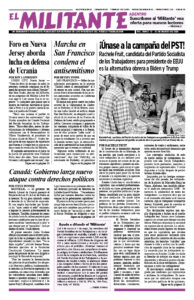In the largest political protest against the regime of Russian President Vladimir Putin and his war in Ukraine since it began over two years ago, thousands gathered for the Moscow funeral of Alexei Navalny March 1. For days after, they kept coming, piling up flowers making a mound that entirely covered the nearly six-foot-high Orthodox wooden cross at his gravesite. Similar mountains of flowers were placed at memorials for political prisoners under Joseph Stalin across the country.
Putin could not suppress this popular outpouring for his hated political rival, whose death at 47 in the Kremlin’s Siberian gulag had been announced Feb. 16.
These acts were the visible tip of the iceberg of opposition among Russian working people to Moscow’s two-year-long murderous war on Ukraine.
 In 2014, Navalny supported the popular Maidan protests and opposed Putin’s armed takeover of Crimea. But as a Russian nationalist, he spoke out for the Crimean Peninsula’s “historic links” with Russia, which earned him enmity among Ukrainians, especially Crimean Tatars.
In 2014, Navalny supported the popular Maidan protests and opposed Putin’s armed takeover of Crimea. But as a Russian nationalist, he spoke out for the Crimean Peninsula’s “historic links” with Russia, which earned him enmity among Ukrainians, especially Crimean Tatars.
From his prison cell Navalny condemned Putin’s 2022 invasion of Ukraine as an attack on the peoples of both countries, saying the “heroism and high motivation of the defending forces can only result in defeat.”
A year later, he had shifted his position on Crimea. He said the only resolution to the war was to return to the borders of Ukraine and Russia “internationally recognized and defined in 1991,” when the Soviet Union disintegrated. This meant Crimea once again being part of Ukraine.
Navalny’s death at the hands of the regime has stoked, not extinguished, opposition. His widow, Yulia Navalnaya, has urged his supporters to carry out his “political will” in a protest against Putin by turning up at polling stations at noon March 17 in the midst of the country’s presidential election.
“There are many people around you who are anti-Putin and anti-war,” Navalnaya said March 6. “If we come at the same time, our anti-Putin voice will be much louder.”

